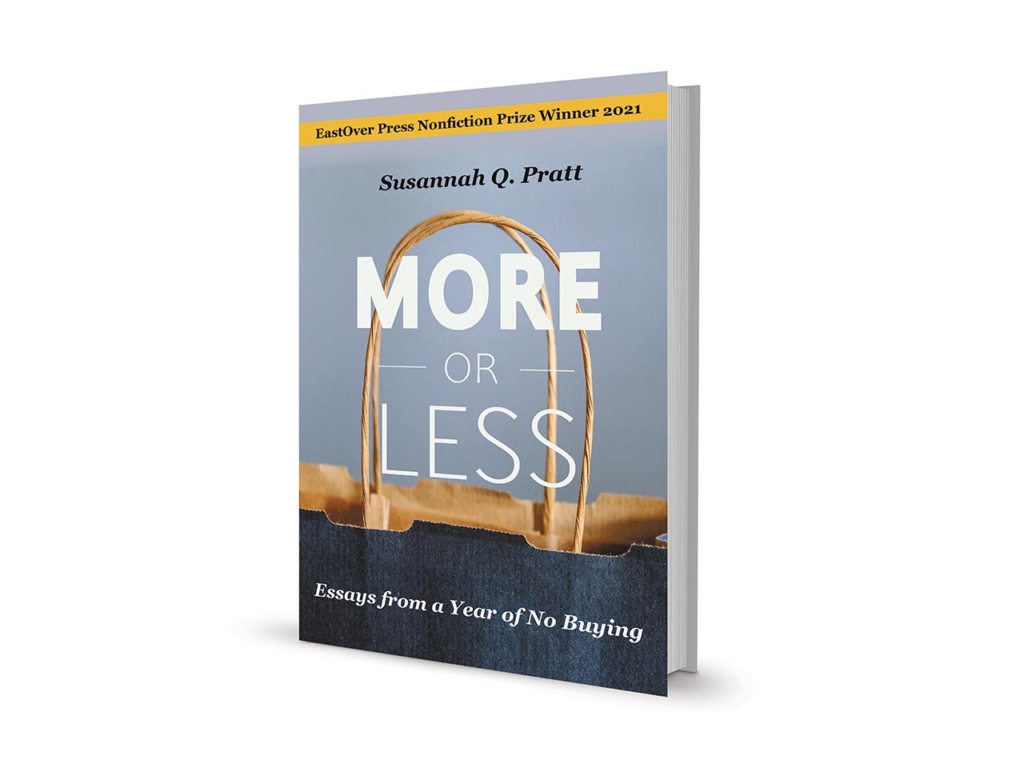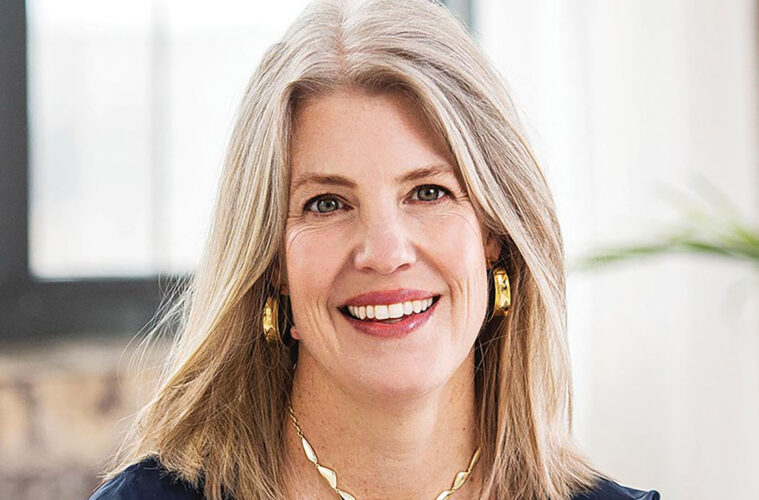Susannah Quern ’95 Pratt reckons with consumerism during a year of no buying
When, during my adolescence, my middle-class parents found themselves ascending to the upper-middle class, my mother resisted. Reluctant to embrace her new reality, she modeled for us an almost pathological restraint. Requests for brand name clothing were dismissed out of hand, and she took almost every opportunity to remind us that our good fortune was not to be counted upon. To underscore this point, she would engage us in worst-case scenario planning, sprinkling dinner conversations with questions like: “What do you think we would sell first if Dad lost his job?” My father, who was, for the record, consistently employed, would smile and shake his head at her.
My sister and I, however, took the bait. We would think together about what we could “get by on,” agreeing to return to a shared bedroom if need be, or thinking through where we could hypothetically hock our TVs. Encouraged by my mother, we discussed what jobs we, as 11- and 13-year-olds, could get if we needed to contribute to the family income. Raised in a different time and place, my mother would have made a great prepper. Even today there is a closet in her suburban home filled with emergency supplies — water, canned goods, batteries, and a crank radio. Oh, and a hatchet. Just, you know, in case.
Thanks to this upbringing, throughout my life I have been drawn to those who harbor suspicion about excess — people who do not assume plenty to be a natural state of affairs. My neighbor, raised in a family of eight, once related a story of restraint so compelling that I took to it as though it were my own. During a childhood trip to New Hampshire, she recalls her mother buying a small package containing four maple sugar candies. So potent was the sugary goodness of every bite, her mother explained, that this one box of four candies would suffice for their entire family. My neighbor reports no one argued when her mother broke the candies in half and laid them on the children’s expectant tongues. What she remembers, instead, is closing her mouth and savoring the sensation of the maple candy melting within.
Inspired by this appropriated memory, I instituted a similar policy and told my three boys, toddlers at the time, that a single-serving bag of M&Ms was meant to last an entire week. Each night at dessert time I doled out four round chocolate candies per boy. A swap meet ensued until each secured his preferred colors, gobbled them up, and then, completely satisfied, hopped down from their chairs and ran off to play. That the bag was designed to be eaten by one person in a single sitting never once occurred to them.
Though my three (now teenage) boys might argue otherwise, restraint is fundamentally different from deprivation. With restraint, choice is implied and so, it follows, is a baseline of power and privilege: I have and I may therefore choose to stop having, or to have less. Voluntary exercises in restraint can thus seem like the province of the fortunate and clueless. It’s one thing to fantasize about giving up a car and using public transportation, it’s another thing to stand outside on the train platform in the subzero wind of a gray Chicago dawn. When going without is not optional, things look different. Viewed from the El platform, my mother’s scenarios or my candy parsimony can seem like the worst kind of playing poor.
On the other hand, when asked with sincerity, the question of restraint is entirely counter-cultural and powerful enough to be a foothold in our slow societal climb toward equity. Choosing to go with less in a culture committed to “having it all” is not just revelatory, it’s revolutionary. Imagine what it might mean for the distribution of resources if those of us with plenty could learn to say, “Thanks, we have enough.” It might mean less plastic in the ocean. It could deliver a serious blow to white privilege. Nothing less is at stake.
Mindful of these issues, in 2018 our family signed on for a year of no buying. After a series of deliberative conversations in the weeks leading up to the start of the year that included — no joke — a PowerPoint presentation that I made and presented to my family, we undertook a 365-day moratorium on the purchase of new clothes, games, books, electronics, gear, housewares, and other things that fall in the general category of “stuff.” For 12 months we purchased only essentials: food, toiletries, light bulbs, and a few pairs of shoes for my growing boys. We stayed out of stores and off of online shopping sites. We fixed things. We made things. We went without.
Imagine what it might mean for the distribution of resources if those of us with plenty could learn to say, ‘Thanks, we have enough.’
Susannah Quern ’95 Pratt
We were hardly the first family to do this. Author Ann Patchett documented her year without shopping in an essay for the New York Times in 2017 and many people immediately followed suit. “Look,” I showed my family in my PowerPoint, “lots of people are doing this. And are HAPPY about it.” My PowerPoint also contained a picture of 5 square miles of plastic trash floating off the coast of Honduras and a bar graph of our family’s annual spending by category. Hard to say which was more stomach turning.
My slide deck didn’t quite connect the dots. Was my plan an effort to save money or the planet? An attempt to clean out or an attempt to find joy? It wasn’t clear because I wasn’t clear. There had been so many factors driving my desire to take my family on this journey: a friend pointing me to a minimalist blog; my children’s dresser drawers, overstuffed and unable to close despite the bags of outgrown clothes I regularly dropped at Goodwill; my increasing sense that climate change is a very personal problem. Its deeper roots lay in values instilled in me by my parents and a life of intermittent churchgoing, as well as annual summer trips to a mountain lake, which remind me that there is a different way to be.
More than anything else, though, it was this: Over the past few years, I had begun to feel oppressed by our stuff. The care, cleaning, and storage of the items accumulated by our dual-income family of five was taking far too much of our time. But the other option — to treat our goods poorly, as though they were all ultimately disposable — didn’t feel right either. We were caught in a trap; spend time taking care of too much stuff or fail to care for said stuff and buy more stuff to solve the problem. Once I began to see our choice in these terms, the weight of our things got heavier and heavier. It was with this logic that I convinced my family to shut off the spigot of incoming items. Within days of implementing our decision, I experienced a great sense of relief. Nothing new was coming at me — nothing that had to be removed from packaging, assembled, accessorized, displayed, used, cleaned, stored, repaired, replaced, recycled, thrown out, or donated. I felt free.
As for the rest of my family? They withheld judgment a little longer. Under the terms of our agreement, the boys were allowed to spend their own money. Because of this, while I enjoyed the immediate effects of less stuff, their lives were at first unchanged. Until they weren’t. And my husband, perhaps the most joyful consumer in our band of five, initially felt constrained by our decision. Until he didn’t. Eventually they, too, realized the quiet liberation that results from less stuff and more time.
As already observed, no writing about these sorts of endeavors is complete without the acknowledgment that exercises like this are a response to privilege. Many people around the globe go without life’s basic necessities. My biggest problem is not that I have too many hand towels; to name it even as bothersome is a luxury.

Despite this truth, I remain convinced that the privileged problem of material accumulation is nonetheless a problem. As Patchett observes, there is a reason each of the major world religions instructs its followers to detach from the material as they seek the divine. In my own tradition, Christianity, Jesus raises this point again and again. I used to dismiss these verses, reading them primarily as admonitions about greed or a misplaced desire for things material over and above things spiritual — problems I did not perceive myself to have. What I have come to believe instead, is that when it comes to material goods, desire is just the tip of the iceberg. It is actual acquisition that clutters not just our space but our souls. Before we realize it is happening, our goods command our energy and attention, become the organizing force behind our lives, and we thus confer upon them greater and greater importance. “But, of course,” explains writer Amor Towles, “a thing is just a thing.”
Acquisition is not just a personal problem. Our consumerism lies at the heart of global challenges — vast inequities, a warming planet. If I am convinced of one thing now, more than at the start of our year, it is that we got into this gigantic mess together, and we are going to need each other to get out. While the decisions I made are primarily my own (and my family’s), each entangles me in a larger web. Where an object was made, how it got to me, what I do with it when I am done; none of this is my problem alone. It took a year of me standing outside the system, looking in, to see this. It will take me a lifetime to figure out how to respond.
Taking an occasional shopping break is not going to save us. Any redemption here comes not from materials reused or money saved, but from a slow awakening. From learning to parse out and discriminate between different levels of desire. From recovering an ability to create and to receive. From, finally, acknowledging that one family’s effort to change is both wholly inadequate and the only real place to start.
This essay is the introduction to Susannah Quern ’95 Pratt’s new book, More or Less: Essays from a Year of No Buying (EastOver Press). Pratt majored in religion and English literature. Her honors thesis, written under the guidance of Professor Sarah Wider, was on women’s personal narrative. Pratt and her husband, three children, two dogs, and a tortoise make their home in Evanston, Ill. Her work has appeared in Literary Mama, The Mindful Word, Chicago Parent, Under the Gum Tree, Essay Daily, and The Week, among others.

